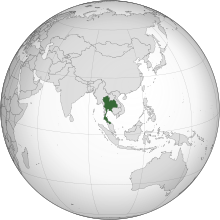
Back معاملة المثليين في تايلاند Arabic ЛГБТ права в Тайланд Bulgarian থাইল্যান্ডে সমকামীদের অধিকার Bengali/Bangla LGBT práva v Thajsku Czech Droits LGBT en Thaïlande French זכויות להט"ב בתאילנד HE Hak LGBT di Thailand ID Diritti LGBT in Thailandia Italian タイ王国におけるLGBTの権利 Japanese Mafên kesên LGBT li Taylendayê Kurdish
LGBTQ rights in Thailand | |
|---|---|
 | |
| Legal Status | Legal since 1956; age of consent equalized in 1997 |
| Gender identity | Change of legal gender not recognised even if the applicant has undergone sex reassignment surgery (bill proposed to allow gender changes)[1][2] |
| Military | Since 2005 |
| Discrimination protections | Sexual orientation and gender identity protections since 2015 |
| Family rights | |
| Recognition of relationships | Same-sex marriage since 2025[3] |
| Adoption | Full adoption rights since 2025[4] |
The rights of lesbian, gay, bisexual, transgender, and queer (LGBTQ) people in Thailand are regarded as some of the most comprehensive of those in Asia.[5][6][7] Both male and female same-sex sexual activity are legal. Legalization of same-sex marriage and adoption of children by married same-sex couples was signed into law in 2024, and came into force on 23 January 2025.[8] Thailand was the first Asian UN member state to pass a comprehensive same-sex marriage law, as well as the first in Southeast Asia and the 38th in the world. About eight percent of the Thai population, five million people, are thought to be in the LGBT demographic.[9]
In 2013, the Bangkok Post said that "while Thailand is viewed as a tourist haven for same-sex couples, the reality for locals is that the law, and often public sentiment, is not so liberal."[10] A 2014 report by the United States Agency for International Development and the United Nations Development Programme said that LGBT people "still face discrimination affecting their social rights and job opportunities",[11] and "face difficulty gaining acceptance for non-traditional sexuality, even though the tourism authority has been promoting Thailand as a gay-friendly country".[11]
Changes in attitudes and public policy towards LGBT issues began to occur in Thailand during the 1990s and, in particular, the early part of the 21st century. In 2015, Thailand enacted a comprehensive anti-discrimination law, which covered sexual orientation and gender identity. In 2022, a group of bills were introduced in the Thai parliament that would have granted either civil partnerships or full marriage for same-sex couples, but did not reach their final readings before parliament was dissolved for the 2023 elections and consequently lapsed.[12][13] In November 2023, the Srettha Thavisin-led Cabinet approved a draft same-sex marriage bill,[7][14] which was considered by Parliament on 21 December 2023 along with three similar drafts proposed by opposition parties and the civil sector. All four passed overwhelmingly and was combined into one bill, which passed the House of Representatives on 27 March 2024 and the Senate on 18 June 2024.[15][16]
- ^ "Proposed law would allow trans Thais to legally change gender". Coconuts Bangkok. 26 July 2017. Archived from the original on 28 August 2019. Retrieved 1 March 2020.
- ^ Cite error: The named reference
:6was invoked but never defined (see the help page). - ^ "'Monumental step as Thai King signs same-sex marriage into law': Thailand to become first Southeast Asian nation to legalize same-sex marriage". 24 September 2024.
- ^ "'Monumental step as Thai King signs same-sex marriage into law': Thailand to become first Southeast Asian nation to legalize same-sex marriage". 24 September 2024.
- ^ Villadiego, Laura (16 September 2018). "Land of lady boys? Thailand is not the LGBTI paradise it appears". South China Morning Post. Archived from the original on 16 May 2019. Retrieved 16 September 2018.
- ^ Condon, Ali (23 November 2023). "Thailand Cabinet approves marriage equality bill, submits it to parliament". PinkNews. Archived from the original on 23 November 2023. Retrieved 23 November 2023.
- ^ a b Browning, Bil (13 December 2023). "Thailand to legalize same-sex marriage". LGBTQ Nation. Archived from the original on 18 June 2024. Retrieved 13 December 2023.
- ^ "Thailand's same-sex marriage bill gets royal endorsement". France 24. 25 September 2024. Retrieved 25 September 2024.
- ^ Limsamarnphun, Nophakhun (24 November 2018). "More rights for same-sex couples". The Nation. Archived from the original on 25 November 2018. Retrieved 24 November 2018.
- ^ Chaiyot Yongcharoenchai (8 September 2013). "The two faces of Thai tolerance". Bangkok Post. Archived from the original on 24 February 2023. Retrieved 28 June 2019.
- ^ a b Kamjan, Chananthorn (17 September 2014). "Gays still face a battle, report says". Bangkok Post. Archived from the original on 24 September 2015. Retrieved 2 September 2015.
- ^ "Parliament accepts public draft bills on same-sex marriage, gender identity". Asia News Network. 29 September 2023. Archived from the original on 4 October 2023. Retrieved 30 September 2023.
- ^ "Thai lawmakers to debate same-sex marriage equality". The Straits Times. 19 December 2023. ISSN 0585-3923. Archived from the original on 19 December 2023. Retrieved 19 December 2023.
- ^ "Marriage equality bill for parliament next month". Bangkok Post. Bangkok Post Public Company. Reuters. 21 November 2023. Archived from the original on 21 November 2023. Retrieved 21 November 2023.
- ^ "Thailand's lower house passes bill to legalize same-sex marriage". CNN. 27 March 2024. Retrieved 20 June 2024.
- ^ "'Monumental step forward': Thailand to become first Southeast Asian nation to legalize same-sex marriage". CNN. 18 June 2024. Retrieved 20 June 2024.